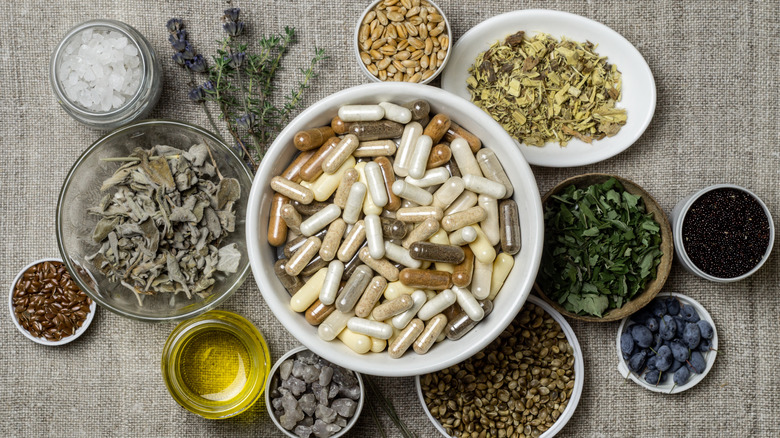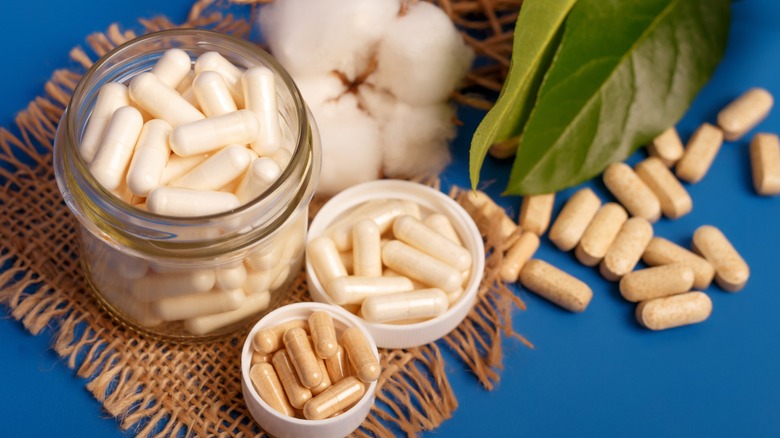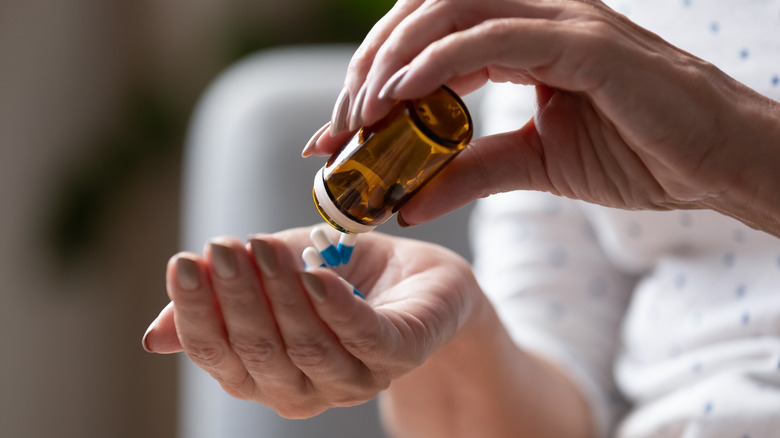Things You Never Want To See On Your Supplement Label
A dietary supplement can be anything from your vitamin pills to your protein powder. They have a wide variety of uses, such as correcting nutrient deficiencies or boosting your protein intake for the day. You can find supplements in pharmacies, grocery stores, or in dedicated supplement stores. When you check the label on a product, there might be ingredients you recognize, as well as others you've never heard of.
The National Institutes of Health Office of Dietary Supplements cautions that many active ingredients in supplements can have a "strong effect on the body." Taking supplements in high doses can cause an adverse reaction, they warn, such as excessive bleeding or problems with anesthesia if you undergo surgery. Supplements are also found in normal food products such as cereal, so you might be getting more than you think. Before you start taking a new supplement, you can check with your doctor to make sure it's appropriate for your needs.
How supplements are regulated
The Food and Drug Administration (FDA) is responsible for regulating the supplement industry, according to the NIH's Office of Dietary Supplements. The FDA also watches over medicines, but it's important to note that supplements and medications are regulated differently. Supplements are intended to, well, supplement your diet. They're not capable of preventing, treating, or curing diseases. Medications have to be approved by the FDA before they're sold, whereas supplements don't need prior approval.
Instead of having the FDA clear their products, supplement companies are responsible for checking their own products for safety and quality. They're also responsible for making sure that the claims they make on their label aren't misleading. However, there's a gray area in the claims that supplement companies can make. They're allowed to say that a supplement can have health benefits or that it supports a bodily function, such as boosting immunity. Since supplement companies are responsible for watching over themselves, there's a possibility that the supplement you buy isn't completely safe or effective.
1,3-DMAA
There are some ingredients that are known to be harmful which slip through the cracks of regulation. The FDA has a list of ingredients to watch out for in supplements. As a consumer, you should avoid purchasing supplements that contain any of these questionable ingredients.
One to watch out for is 1,3-DMAA. According to the FDA, this ingredient is an amphetamine derivative that's been used in weight loss and sports performance supplements.
Although it was once approved as a drug to treat nasal congestion, DMAA is no longer approved for medical use by the FDA. It can cause high blood pressure and may lead to shortness of breath or even a heart attack. It does so by narrowing blood vessels and arteries. The FDA has taken deemed DMAA unlawful and has been working to remove all products containing this ingredient from circulating. If you happen to come across a product that contains it, do not take any.
5-alpha-hydroxy-laxogenin
Originally identified in the 1960s, laxogenin is a plant-based steroid. It helps promote growth in plants (per the Department of Defense's Operation Supplement Safety), but has been marketed as an alternative to traditional anabolic steroids in humans.
Laxogenin is thought to promote muscle growth, strength, and low body fat. That said, the Department of Defense clarifies that although these claims have been made, there's no scientific evidence to support them. Laxogenin and its derivative 5-alpha-hydeoxy-laxogenin have been purportedly used in supplements in the past. However, it's on both the Department of Defense's prohibited dietary supplement list and the FDA's supplement advisory list.
No studies using this supplement have been performed on humans, so it's hard to say whether it's safe or not. Interestingly, supplements that claimed to contain either ingredient were found not to contain any. The Department of Defense warns that supplements that say they include either ingredient could be a scam and contain other illegal drugs.
Hordenine
Hordenine can be taken from plants such as barley or made synthetically by humans, according to the Department of Defense's Operation Supplement Safety. No matter how it's created, hordenine supplements act as a stimulant. Hordenine is chemically similar to other phenethylamines, and is even related to ephedrine. When ephedrine-containing weight loss and athletic performance were banned for being unsafe, hordenine was used as a replacement.
The FDA labeled hordenine as a new dietary ingredient, which means that it's not approved for use in supplements. Any supplement containing a new dietary ingredient must be cleared by the FDA before sale. Some of the side effects of taking hordenine include rapid heart rate and high blood pressure.
Some companies add hordenine under a different name in their ingredients list (such as anhaline or eremursine) to try to hide it. The National Collegiate Athletics Association includes hordenine on its banned supplements list.
High levels of caffeine
For some people, coffee provides a daily dose of caffeine. It might not seem like a dangerous dietary supplement because it's so widely consumed, but high levels of caffeine can be harmful.
The National Science Foundation warns that high levels of caffeine from supplements can cause anxiety, restlessness, racing heart beat, or an irregular heartbeat. Teenagers are particularly vulnerable. Caffeine can be found in pre-workout supplements and green tea extract.
According to the Food and Drug Administration, caffeine becomes toxic at around 1,200 milligrams in a day and can result in seizures. That equates to roughly 12 to 15 cups of coffee. They note that while 400 milligrams of caffeine per day is generally safe, people will react differently depending on how sensitive they are to caffeine. Your body weight and the medications you take can also affect how much caffeine you can safely ingest. If you take a caffeine supplement and drink coffee or tea, it might be helpful to check how much caffeine you're consuming daily.
Prohormones
Athletes in particular should be wary of any supplement containing "prohormones." While it might seem benign, they can actually contain anabolic steroids and cause an athlete to fail a drug test.
A study published in Sports Health investigated so-called "contaminated supplements" that contained steroids or other illicit drugs. According to the authors, 634 different nonhormonal dietary supplements were tested beginning in the year 2000 — and 14.8% were found to contain hormones or prohormones. Another name for prohormones is "designer steroids," according to the authors. They're made chemically different than common anabolic steroids with the intention of avoiding drug tests. Some of them have been linked to liver failure and hepatitis.
If an athlete takes a supplement contaminated with even a tiny amount of prohormone, it can cause them to fail a drug test. Contaminated supplements can be difficult to trace. The study explains that a .00005% contamination of 19-norandrostendione is enough to cause a failed drug test.
Extreme performance-enhancing claims
Making progress towards your fitness goals can be challenging. It's tempting to reach for anything that can give you a little edge, whether it be for weight loss or sports performance. However, some supplements take things too far with the promises they make.
Beware of so-called extreme performance-enhancing claims, warns the U.S. Anti-Doping Agency. Categories of supplements that often contain such claims include muscle-building, weight loss, and sexual enhancement products.
The USADA warns that products in these categories are the most likely to be contaminated with illicit ingredients that aren't on the label. Athletes should avoid all supplements in these categories to decrease their risk of failing a drug test from consuming contaminated supplements. They explain that you should be skeptical of any claim a supplement makes that you couldn't achieve by simply eating food. Claims of rapid muscle growth, for example, can be treated as a red flag that you should avoid a supplement.
You don't see NSF on the label
While the FDA is responsible for overseeing most supplements, there are independent organizations that test and label supplements as safe. Athletes or anyone looking to avoid contaminated ingredients in their products should look for these trusted labels. The U.S. Anti-Doping Agency recommends looking for the NSF label, which stands for National Science Foundation. Particularly, you're looking for the NSF Certified for Sport logo on a supplement.
To become an NSF Certified for Sport product, a company has to pass a series of qualifications. The NSF will test the product to make sure that it doesn't contain any of the 280 ingredients that have been banned by major sports organizations. They'll test to make sure that the ingredients advertised are actually what's in the supplement. Then, they ensure that there aren't unsafe levels of contaminants included. They also check the manufacturer with two annual audits to make sure they're following good manufacturing practices.
Multiple stimulants
Products might combine sets of stimulants to achieve a greater effect, but this isn't always healthy. One supplement was found to contain caffeine, cocoa extract, BMPEA, evodiamine, synephrine, green coffee bean extract, and guarana seed, according to Consumer Reports. All of those ingredients are considered stimulants, which is dangerous because you don't know how much you're actually getting in total. It can be hard to quantify the effect of taking all of them at once.
Although it's technically legal to do, consumers should be aware if they're sensitive to stimulants. Diabetics, people with epilepsy, and those who suffer from heart arrhythmias should be wary of any supplements that might contain stimulants with names other than caffeine. You can search for products that explicitly say that they're stimulant-free if you're concerned. Another trick supplement companies use, warns Harvard University's Dr. Pieter Cohen, is changing the name of a stimulant to something that is technically correct but misleading.
SARMs
Selective androgen receptor modulators, also known as SARMs, are banned for use in all sports competition, according to the U.S. Anti-Doping Agency. They're similar to anabolic steroids, except traditional anabolic steroids produce more male characteristics in people who take them. SARMs bind to specific tissues, meaning they don't necessarily have the same overall effect on the body as a regular anabolic steroid. This makes them useful for treating medical conditions that cause muscle and bone wasting, such as osteoporosis, cancer, and HIV.
They're still being investigated, according to the USADA, and aren't legal for use in supplements. Someone who takes SARMs could experience an increased risk of heart attack or stroke. The long-term effects are unknown. While it's illegal for use in supplements, SARMs have found their way into a surprising amount of products. The USADA claims that there are roughly 120 supplements that were found to contain some version of SARMs. They've been discovered under different names, such as ostarine and andarine.
Artificial colors
Have you ever wondered why vitamins are sold in an assortment of wonderful colors? Even though they're touted as important for your general health, vitamins might not be as friendly as they seem. If they contain certain artificial colors, however, they might not be good for your health. According to the American College of Healthcare Sciences, the color red #40 has been linked to child hyperactivity in kids who consume it.
The FDA monitors and keeps track of the color additives that are safe and allowed in foods. Therefore, most supplements you purchase shouldn't have any harmful food colorings in them. However, if you're concerned, you can check the supplement label. Any product you buy should list the artificial colors they used.
The FDA explains that while some evidence shows that food colorings might be harmful in children, that's not entirely proven. If you're concerned, you can avoid giving vitamins or other supplements that contain food coloring to your children.
St. John's wort
Some supplements aren't obviously dangerous. They might not have ingredients that are directly harmful to your body, but they can interact with medications and cause unwanted side effects (via Penn Medicine). One supplement that certain people should avoid is St. John's wort (per Mt. Sinai). It can interact with some types of antidepressants and birth control to make them less effective .
It's important to research drugs before taking them, because some seem benign but can have unwanted side effects. St. John's wort is an herbal supplement that's used as an anti-inflammatory treatment for wounds and burns. It's also been investigated for treating mild to moderate depression. In spite of its potential benefits, it can cause an upset stomach, fatigue, headache, or increased sensitivity to sunlight.
Woman who are tying to become pregnant should not take this supplement because it can interfere with fertility. The risks can outweigh the benefits of taking this supplement, depending on the drugs you're taking and your medical history.
Supplements claiming to be cures
Some supplements are dangerous because of their side effects or because they contain potentially harmful contaminants. Another danger that supplements pose is false claims.
For example, if you take a supplement to treat a medical condition, it might not work and you will still need proper medical treatment. It's illegal for supplements to make claims that they can treat medical conditions, explains the Federal Trade Commission, because they're proven to be neither safe nor effective.
If you see a product that advertises itself as a treatment for medical problems, skip it. Not only could it be a waste of money, you could take something that harms your health, warns the Federal Trade Commission. They warn that the same is true for weight loss products. Some supplements claim to be able to help you lose weight, but to truly shed pounds, you need a combination of proper diet and exercise. Don't fall victim to promises of false results. Research supplements before you buy them to make sure they can actually do as they claim.
Unapproved pharmaceutical ingredients
Buying supplements that aren't certified to be safe increases your risk for encountering something contaminated. It might come as a surprise to you that some of these contaminants could actually be pharmaceutical drugs that you'd otherwise need a prescription for.
A study published in Public Health found that from 2007 to 2016, unapproved pharmaceutical ingredients were found in 776 different dietary supplements. They mostly fell into the categories of weight loss, sexual enhancement, or muscle-building.
Of the unapproved ingredients the researchers found, one of the most common was sildenafil, which was found mostly in sexual enhancement supplements. Sildenafil is the active ingredient in Viagra, which is used to treat erectile dysfunction. They also found sibutramine, which was banned in the U.S. after 2010 for potential heart risks. In some of the muscle-building supplements, they found steroids or steroid-like products that weren't listed. That's why it's important to stick to supplement brands that are trusted or that are certified by organizations like the National Science Foundation.















